Mystify yourself with the symbolic significance of the olive press in biblical narratives and its potential relevance today.
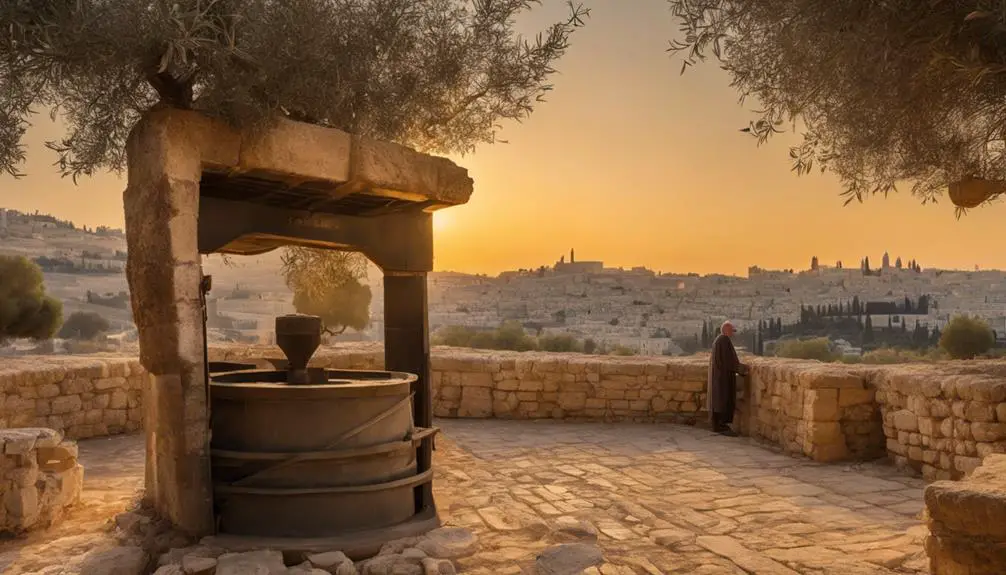
Olive Press in the Bible
Ponder the pivotal place the olive press plays in biblical passages. Its appearances are not mere coincidence; they carry a deeper, symbolic meaning.
As you traverse through these historical narratives, you'll uncover the olive press's significant role in ancient rituals, its symbolic ties to pressing trials and tribulations, and its potential modern-day relevance.
So, why does this seemingly simple agricultural tool warrant such attention and interpretation in biblical literature? Let's explore together.
Key Takeaways
- The olive press is significant in biblical narratives, symbolizing struggle, transformation, and divine blessing.
- Key biblical events, such as Gideon's story and the Garden of Gethsemane, highlight the olive press's practical and spiritual role.
- Christian teachings use the olive press as a metaphor for believers' trials, refining them into stronger characters through resilience and faith.
- The olive press's enduring relevance, blending tradition and innovation, reflects its symbolic importance in modern society and its adaptability to contemporary needs.
Historical Background of the Olive Press
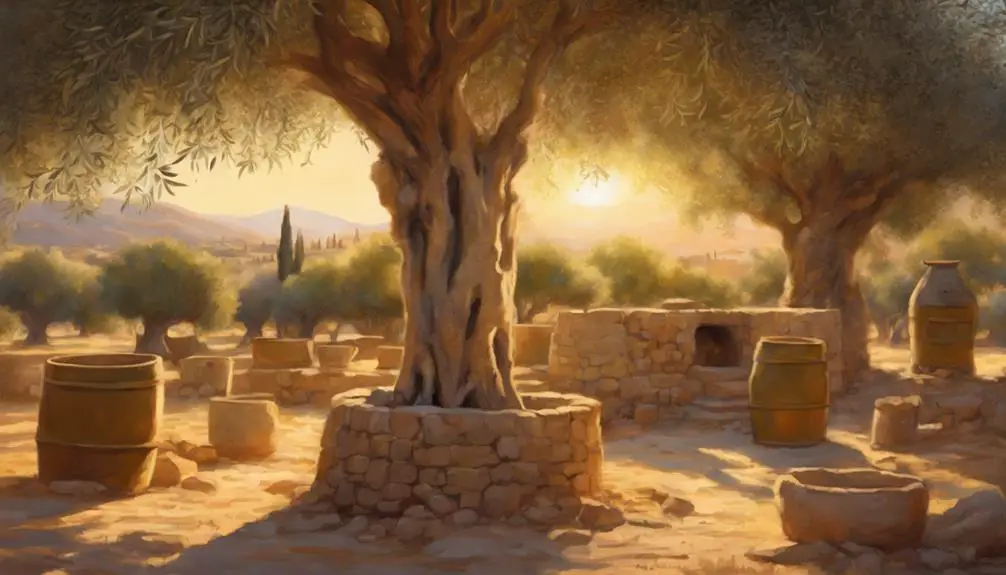
Delving into the annals of history, you'll find that the humble olive press, a cornerstone in ancient Mediterranean societies, played a pivotal role in economic, religious, and daily life. This sturdy contraption's construction was meticulously designed to extract the precious oil from the fruits of ancient olive cultivation, and it was a testament to the ingenuity of our ancestors.
In the realm of Olive Press Construction, you'll notice the device was an amalgamation of simplicity and functionality. Broadly constructed from a large basin and a grinding stone, both usually hewn from granite, it was operated manually. The olives were first crushed under the stone, then pressed to extract the oil. This simple yet effective design made it an essential tool in ancient societies, where olive oil was a staple.
Digging deeper into Ancient Olive Cultivation, it's evident that the olive tree was revered and cultivated with great care. Olive groves dotted the landscape, and the harvesting process was a community affair. The harvested olives were then taken to the olive press, where the community gathered to witness the extraction process. This communal involvement in the olive oil production process reinforced the olive press's central role in these societies.
Biblical References to Olive Press
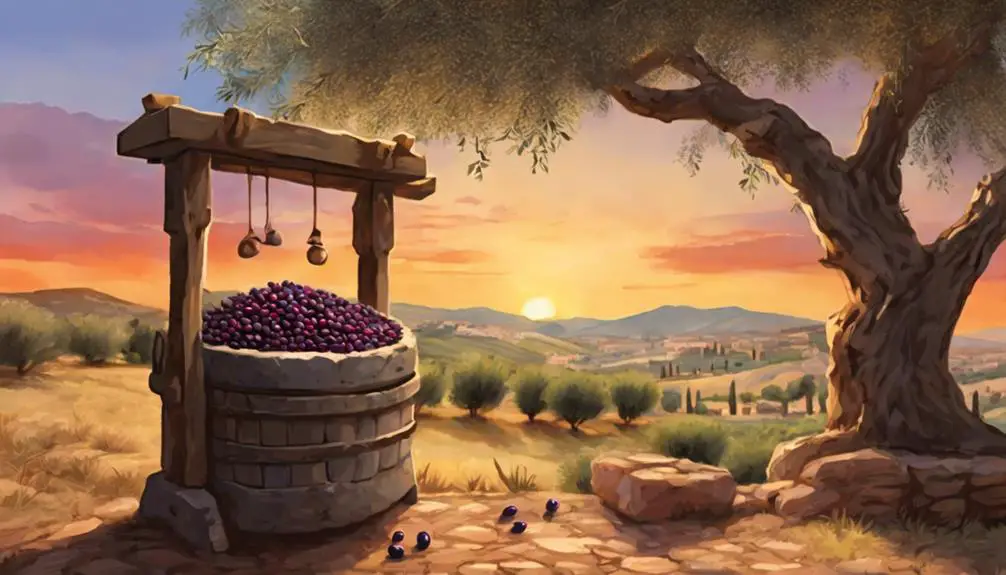
In the sacred scriptures of the Bible, the olive press emerges as a symbol, richly steeped in meaning, that weaves itself into the narrative of many pivotal events. You'll find mentions of it in the context of Olive Press Miracles and also in descriptions of Press Construction Techniques.
For instance, in Judges 6:11, Gideon is found beating out wheat in a winepress, which was an olive press, to hide from the Midianites. This shows the practical utility of the press. The New Testament also makes references to the olive press, notably in the context of Jesus' time in the Garden of Gethsemane. The word 'Gethsemane' itself translates to 'oil press', indicating the presence of an olive press.
To help you understand better, here's a table summarizing two major biblical references:
Reference |
Context |
|---|---|
Judges 6:11 |
Gideon hiding in the press |
Garden of Gethsemane |
The place of Jesus' prayer and arrest |
The olive press, thus, not only played a significant role in daily life but also in the spiritual narratives of the Bible. The scriptural references paint a vivid image of its importance.
Symbolic Interpretations of Olive Press
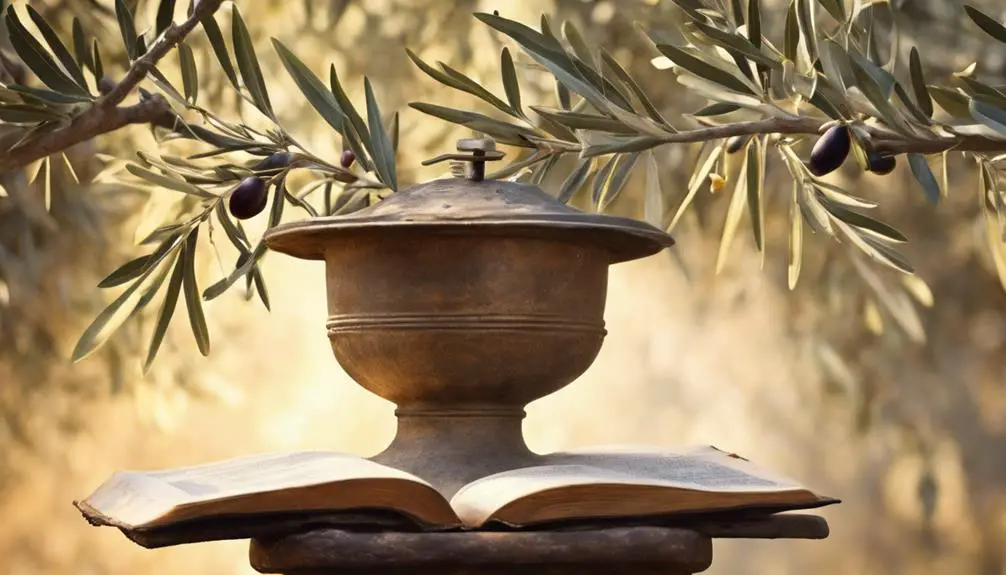
As you explore the symbolic interpretations of the olive press, you'll uncover a wealth of meanings that reveal the press as a metaphor for struggle, transformation, and divine blessing in the biblical narratives. The olive press, in its historical and biblical context, wasn't just a physical tool but an emblem with profound spiritual implications.
- The process of pressing olives was laborious, suggesting a metaphor for human struggle and endurance.
- Olives are transformed into oil through pressing, symbolizing spiritual transformation.
- The quality oil produced spoke of divine blessing and abundance.
In the Bible, Olive Symbolism is deeply intertwined with these Press Metaphors. The olive tree itself is a symbol of peace, prosperity, and God's blessing. Therefore, the act of pressing these olives and extracting valuable oil can be seen as an allegorical process of spiritual maturation and divine favor.
It's important to note that this symbolic interpretation isn't arbitrary but is rooted in the cultural, historical, and literary context of the biblical text. Understanding these metaphors enriches our understanding of the biblical narratives and their spiritual lessons.
Olive Press and Christian Teachings
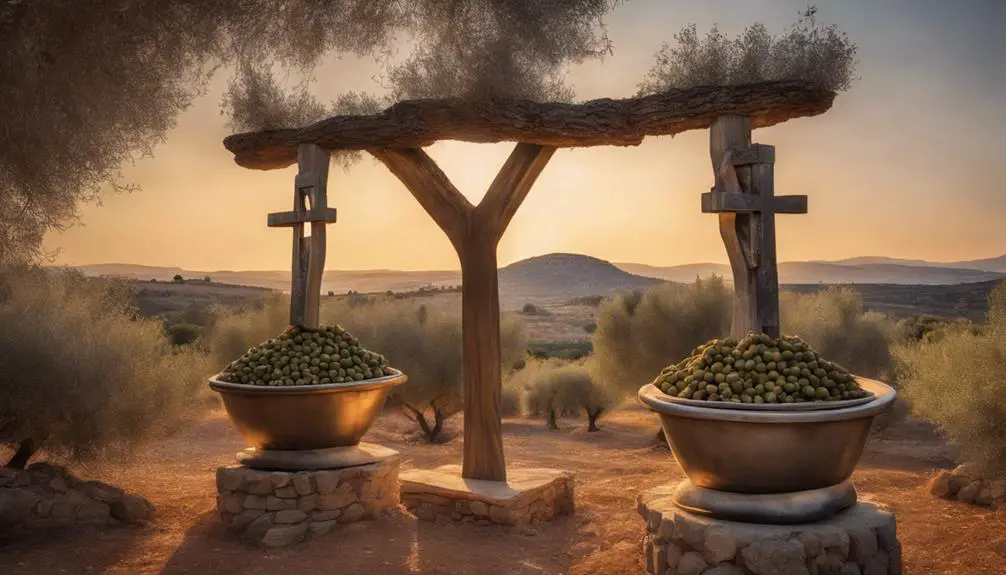
Examining Christian teachings, you'll find a multitude of references and lessons deeply tied to the olive press, making it an integral part of the faith's rich spiritual tapestry. This tool, used for extracting olive oil, is a profound symbol in Christianity, and the processes involved carry significant spiritual implications.
The 'Pressing Resilience' of the olive fruit under the press exemplifies the Christian virtue of perseverance. It's a metaphorical comparison to the trials and tribulations that believers go through, pressing them into a refined character much like the olive oil. The pressure of the olive press, therefore, isn't a symbol of punishment but one of refinement, resilience, and ultimate transformation.
On the other hand, 'Olive Miracles' shed light on the divine intervention and providential care in the Christian faith. Olive oil, a product of the press, was used for anointing kings and healing the sick in biblical times, demonstrating divine favor and miraculous intervention.
The olive press thus provides a rich reservoir of wisdom and understanding in Christian teachings, presenting a vivid illustration of resilience in trials and the miraculous power of faith.
Modern-day Relevance of Olive Press
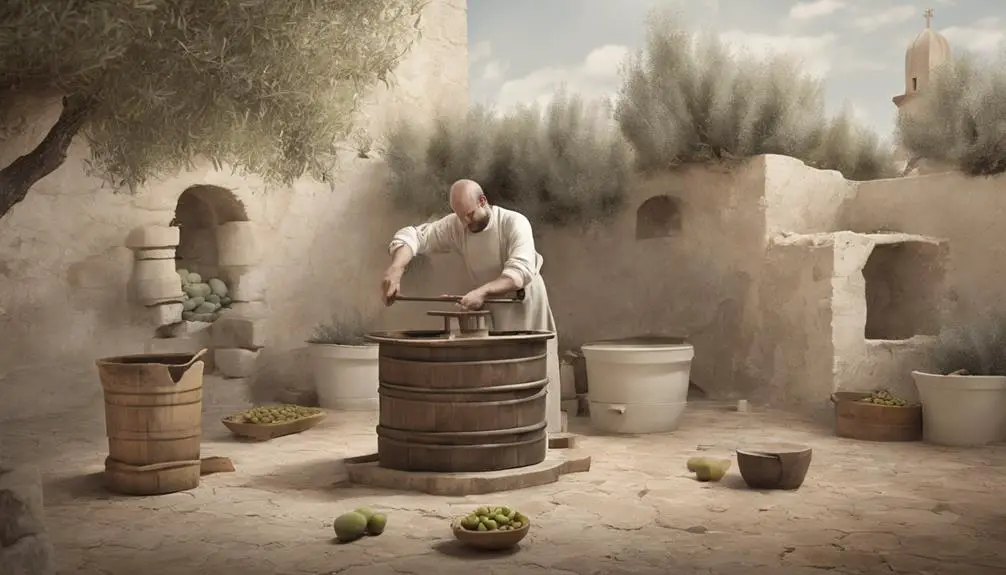
Despite its ancient roots, the olive press still holds a pivotal role in today's modern society, not just for the production of olive oil, but also as a symbol of resilience and transformation. You'll find that advancements in press technology have only heightened the relevance of the olive press, demonstrating a crucial blend of tradition and innovation.
To better grasp this, consider the following:
- Modern press technology has boosted olive oil production, allowing for increased efficiency and higher quality output.
- The health benefits of olives, including their heart-healthy fats and antioxidant properties, have been widely recognized, further driving the demand for olive oil.
- The olive press symbolizes an enduring spirit of resilience, an attribute highly valued in our fast-paced, ever-changing world.
The olive press, with its age-old roots, continues to influence not just the culinary world, but also our social and cultural landscapes. Its enduring relevance is a testament to its versatility and fundamental role in society. By appreciating this, you'll better understand the profound impact of the humble olive press, from biblical times to our contemporary world.
Frequently Asked Questions
What Is the Process of Extracting Oil From Olives in an Olive Press?
You start by harvesting olives using specialized techniques. Then, you clean and prepare them for pressing.
Over time, the design of olive presses has evolved to extract oil more efficiently. Today, you'd probably use a mechanical press, which crushes the olives and separates the oil.
It's a fascinating process, combining ancient traditions with modern technology.
Are There Any Health Benefits Associated With the Oil Produced by the Olive Press?
Yes, there are numerous health benefits associated with olive oil.
It's rich in monounsaturated fats, which promote heart health.
It also contains antioxidants that fight inflammation and reduce the risk of chronic diseases.
It's a key component in the Mediterranean diet, often praised for its health benefits.
You'll find olive oil used extensively in biblical recipes, symbolizing health and healing.
Are There Other Biblical Texts Outside the Bible That Mention the Use of the Olive Press?
Yes, you'll find references to the olive press outside the Bible. The olive press symbolism is often used in various religious texts and doctrines.
You'll also notice the press being used in parables, teaching moral lessons. These instances show the importance of the olive press in ancient cultures, highlighting its role not just in food production, but also in religious and societal contexts.
How Does the Olive Press Compare to Modern Methods of Oil Extraction?
You'd find that the press evolution has significantly advanced oil extraction methods. Unlike the simple crushing and pressing of olive varieties in ancient times, modern methods use centrifugation for higher yields.
It's efficient, but also removes the olive's natural antioxidants. Some argue that the older, more laborious methods produced higher quality oil, retaining more of the olive's natural benefits.
It's a classic case of tradition versus technology.
What Are the Environmental Impacts of Using an Olive Press?
When you use an olive press, you're employing a method with minimal environmental impact. Traditional pressing techniques don't require electricity, reducing carbon footprint.
Also, waste is biodegradable, having a smaller impact on our ecosystem. Different olive varieties may yield more oil, cutting down on the quantity needed, thus preserving resources.
It's a sustainable choice, especially when compared to more modern, energy-intensive extraction methods.
Conclusion
So, you've journeyed through the historical significance of the olive press, its biblical mentions, symbolic interpretations, and its influence on Christian teachings.
Today, its relevance is still palpable, not just as a relic of the past, but as a symbol of endurance and divine intervention.
It's a potent reminder that even under pressure, something beautiful and useful can emerge – just like the precious olive oil from the olive press.



Sign up